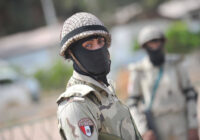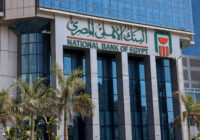Egypt is expected to have “improved” its commitment to democratic principles, despite being ruled by the military.
Thanks to leaks from Egypt’s intelligence agency, Al Jazeera has managed to discover how democracy and free speech work in Egypt.
Captain Ashraf el-Kholi is a mid-ranking officer in the “much-feared” Mukhabarat Askariya (military intelligence). Going well beyond his duties of gathering information for the sake of national defense, Kholi applied himself to putting pressure on the media to toe the government’s line and discredit rival politicians.
Not only is he heard on the tapes “instructing a number of talk-show hosts and TV personalities on what they must say in the wake of President Donald Trump’s controversial Jerusalem decision,” he also explains what they must say about the former prime minister and presidential candidate, Ahmed Shafik. “As you know Shafik is acting based on his own thinking.”
Here is today’s 3D definition as it is used in Egypt and a few other countries:
Thinking:
Subversive behavior
Contextual note
Al Jazeera comments that thinking has become “something that is criminal in 2018 military-run Egypt — especially because the country is gearing up for presidential elections.” Everywhere in the world, democracy has to some extent been reduced to the ritual of voting. Holding elections provides sufficient proof that a nation is a democracy. That very fact makes it tempting for governments and prominent politicians to find a way of limiting freedom of expression and the terms of public debate so that the results of elections become predictable.
Cultivating a complicit media has become an art form practiced by seasoned politicians and their spin-masters in every democracy. Elections themselves have increasingly become a form of entertainment akin to sports competitions. This transformation of the role of media provides the key to restricting and otherwise orientating the scope of political debate. But the illusion of open debate and of democracy itself will disappear if thinking is in any way repressed.
In Western democracies, corporate media, on the one hand, and established parties funded by special interests, on the other, monopolize electoral debate. They frame the issues they consider worthy and that citizens will be invited to vote on. Democracy appears seriously compromised, but the managers of democracy will scrupulously defend the right of individuals to think and speak for themselves.
Historical note
In most democracies, only certain brands of thinking are disallowed. In the US, for example, since the end of the Second World War, thinking like a communist or a socialist constituted not only a sufficient reason to disqualify a candidate for public office but, for a brief period — when the thinking of Joe McCarthy was dominant — it was deemed a crime tantamount to treason.
 That seems to have changed recently, thanks to Bernie Sanders, who made a major impact on the 2016 presidential election while claiming to be a socialist. It’s a good measure of the precipitous loss of prestige attached to the notion of capitalist thinking since the financial crisis of 2008 that Sanders managed to seriously challenge Wall Street favorite Hillary Clinton for the Democratic nomination. Many think, even as a declared socialist, he could have defeated Donald Trump in the November election.
That seems to have changed recently, thanks to Bernie Sanders, who made a major impact on the 2016 presidential election while claiming to be a socialist. It’s a good measure of the precipitous loss of prestige attached to the notion of capitalist thinking since the financial crisis of 2008 that Sanders managed to seriously challenge Wall Street favorite Hillary Clinton for the Democratic nomination. Many think, even as a declared socialist, he could have defeated Donald Trump in the November election.
Egypt takes us a giant step further, which may help us to understand its close alliance with the increasingly authoritarian monarchy in Saudi Arabia managed by Crown Prince Mohammed bin Salman. As a monarchy, the Saudis don’t have to pretend to apply democratic principles. Egypt is a different case. Especially, after the Arab Spring and the ouster of the despot, Hosni Mubarak, Egypt is expected to have “improved” its commitment to democratic principles, despite being ruled by the military.
Al Jazeera reminds us that Shafik adheres to the same policies as the autocratic president, Abdel Fattah el-Sisi. “Both men believe the military should rule, both have worked tirelessly to suppress pro-democracy activists, and both vehemently despise the Muslim Brotherhood.” And yet Shafik must be marginalized and discredited by the media.
The difference is that Shafik has allowed himself to do “his own thinking” to reach the same conclusions.
*[In the age of Oscar Wilde and Mark Twain, another American wit, the journalist Ambrose Bierce, produced a series of satirical definitions of commonly used terms, throwing light on their hidden meanings in real discourse. Bierce eventually collected and published them as a book, The Devil’s Dictionary, in 1911. We have shamelessly appropriated his title in the interest of continuing his wholesome pedagogical effort to enlighten generations of readers of the news.]
The views expressed in this article are the author’s own and do not necessarily reflect Fair Observer’s editorial policy.
Photo Credit: Mohamed Elsayyed / Shutterstock.com
Support Fair Observer
We rely on your support for our independence, diversity and quality.
For more than 10 years, Fair Observer has been free, fair and independent. No billionaire owns us, no advertisers control us. We are a reader-supported nonprofit. Unlike many other publications, we keep our content free for readers regardless of where they live or whether they can afford to pay. We have no paywalls and no ads.
In the post-truth era of fake news, echo chambers and filter bubbles, we publish a plurality of perspectives from around the world. Anyone can publish with us, but everyone goes through a rigorous editorial process. So, you get fact-checked, well-reasoned content instead of noise.
We publish 2,500+ voices from 90+ countries. We also conduct education and training programs
on subjects ranging from digital media and journalism to writing and critical thinking. This
doesn’t come cheap. Servers, editors, trainers and web developers cost
money.
Please consider supporting us on a regular basis as a recurring donor or a
sustaining member.
Will you support FO’s journalism?
We rely on your support for our independence, diversity and quality.






